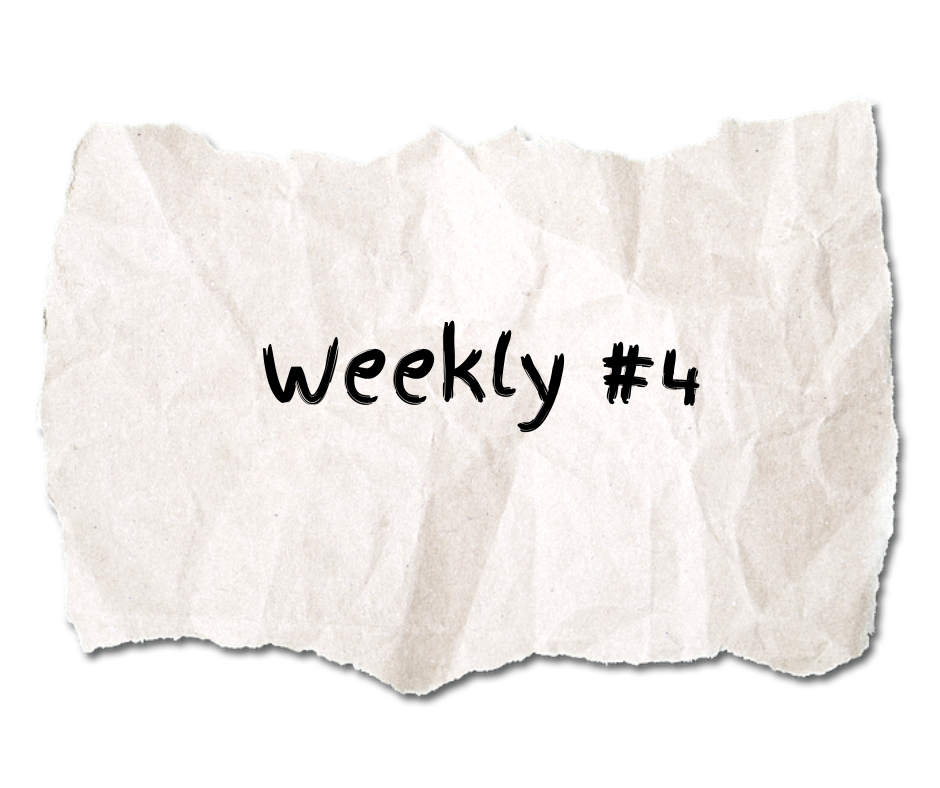Weekly #4: A Hanging Bridge, a Scary Poll, a Manifesto, and an Extinct Tradition
What We're Growing On This Week
Each week, something for your curiosity and something to inspire you to grow.
Privilege or burden?
I’ve always felt privileged, some way. In many other ways, bizarrely, I felt inadequate.
The deeper I went into life, I got an ever stronger impression that my privilege was having to go through some hell that would deliver me to a better place. Going through that hell not as a victim, but as a candidate for redemption.
I wrote this piece in response to a writing prompt on the topic of privilege.
The Upside Down Is My Privilege
They were doing a poll in front of the supermarket. Make your privilege work for you, read a roll-up banner. And below, in smaller print: Share your privileges, and you may be up for an unbelievable prize! A young woman approached me with a professional smile.
Missing the forest for the trees
The call of the Black Forest took me yesterday to a waterfall that is one of the highest and most spectacular in Germany. I’d wanted to go since they opened a suspended bridge (Blackforest Line) crossing the ravine at a dizzying height. It’s 450 metres long and hangs 120 m high in the air. Official pictures and videos are here.
It’s a fantastic experience. The trail to the waterfall, then uphill until you reach the bridge at the top, opens up to the breathtaking scenery of what is called the High Black Forest, which is marked by steep mountains furrowed by narrow valleys created by glaciers.
From the bridge, the waterfall looks far, far away underneath. You’re basically walking on air.



You might wonder, what’s there to reflect on?
I’ve been telling you only half of the story.
The Black Forest Facebook group I’m in has seen dozens of pictures of the place. The posts were enthusiastic about the landscape and the experience.
And the comments below the pictures went on and on about …?
The entrance ticket price.
And why is there a fee for the waterfall if the waterfall was made by mother nature. Why does it cost so much. Another suspended bridge elsewhere is for free. There is a price for the waterfall and the bridge, another for the waterfall only, but why isn’t there a price for the bridge only. But it includes the parking. No, it doesn’t. Well, the parking is free, unlike the other waterfall, where you need to park in a paid facility.
You get the idea.
70+ comments about the prices.
I couldn’t help reflecting on how easy it is to miss the forest for the trees. To get lost in the wrong debate, missing the point, which in this case was: it’s a unique experience in a fantastic place.
I’m sure you have witnessed similar situations.
Do you try to raise a red flag or move on?
Was it ever you who got carried away? You know, like your kid wins a race, but you’re nagging about them having torn their shoes.
Is there a friend or a family member who is always the voice of reason, calling out when the others are missing the real point?
Would there be ways to check ourselves when we’re starting to slide down the wrong road?
Valid claims, or fallacy?
This week, an alarming report was published about the outcomes of a representative poll on violence against women among young men in Germany. According to the NGO that commissioned it, the poll revealed that one out of three men in Germany doesn’t have a problem using physical violence against women. The respondents were 18-35 years old, both men and women. Based on the results, the report concluded that traditional gender roles are still strong in Germany.
The report had a great echo: several press outlets picked it up, and even politicians made statements about the outrageous findings.
And yet, Frankfurter Allgemeine Zeitung (FAZ) published a detailed analysis of the polling methodology, questioning the soundness of its conclusions. FAZ found, among other things, that the respondent pool stemmed from an online platform where users register their availability to be polled. Besides, they are rewarded financially for taking part.
This means that the poll cannot be considered representative of the German society as a whole, because the respondent pool had already been limited to individuals who
are happy to take part in polls and had registered on that platform;
are attracted by the financial incentive – whatever that may say about their background.
None of the other news agencies and journals questioned the poll’s validity nor enquired about its methodology. The politicians eager to issue declarations apparently didn’t do it either.
So let us take a moment to reflect again on the weight of the words we use. When is a small sample representative of the whole?
How do we jump from “these people think…” to “everybody thinks…”?
From “I didn’t like that book” to “That book is crap”? From “Pushing myself works for me” to “You must push yourself”? From “Me and my friends are like this” to “That’s what is normal”.
How do we go from our perception to a statement on what is right or wrong?
Clichés and profound truths
This theme has been with me since I started writing the Mindfulness Myths series. But it reached a climax while working on Myths #4 and #5, where I moved from positive thinking to accepting and letting go.
What made me start this series was a need to oppose the flood of mindfulness clichés we are exposed to. As someone who practices mindful living as a routine, I’m a bit fed up with how un-mindfully people drop phrases such as “positive thinking”, “accept that”, or “you must let go.”
There’s a quantum leap between talking about something and experiencing it. The actual experience becomes fossilised in a formula. No wonder people interpret it the way that suits their context best. No wonder, then, using those words hardly helps improve their lives.
My ways of dealing with this are:
paraphrasing the established words with words of my own;
telling a story of that experience to help recreate it, instead of naming it.
That’s why I write the Mindfulness Myths: to convey what I think “positive thinking” means by giving you a story that embodies it.
I still remember my grandma teaching us it was a sin to say the word God, especially in such phrases as “oh my god!”, or “By god, …”, because, she said, it was taking God’s name in vain.
How do you deal with words that have become clichés but which you feel still capture something that would be worth preserving?
How do you handle the tension between a profound truth and its trivialised name? Those big words like “freedom”, “fulfilment”, “personal growth”, “dignity”, “love”, “God”,… and so on?
Routine and belonging
A Stammtisch is in German a table that is permanently reserved for a specific group in a pub or restaurant. A regulars’ table, the internet suggests as a translation. Interestingly, Stammtisch refers to the table but also to the event: coming together regularly, for example, Fridays at 7 pm.
As it was practised in the past, the genuine Stammtisch had a specific content, too: it was about drinking beer and talking politics. Hitler made his first speeches at such Stammtisch reunions.
Alternatively, they played games – while drinking beer.
An article in our local newspaper investigated whether there are any Stammtisch left in our town. There still are (a few) groups coming together, sticking to a habit of going out to the same place. One restaurant owner mentioned that there are women coming at about the same time on Fridays, but they don’t always even know each other.
It made me think of how the Stammtisch was almost an institution (as I read here) and how it has become solely a matter of going out. It has lost its function of coming together for a purpose, with an agenda.
I still remember the Germany of the early 90s, with tables bearing the sign Stammtisch¸ where no one was sitting even if the Stammtisch group wasn’t there. The Stammtisch tables are no longer holy, if they still exist at all.
The Stammtisch meant the stability of a routine and the sense of belonging in a group.
What do you have in place to cover these needs?
Are there any routines you may not fully appreciate but miss when you go away? What support do they give you?
If you are struggling with a particular area of your life, could a routine help you to deal with it by offering stability and something to rely on?
Is there a group you feel you belong with? Do you have any rituals that reinforce your togetherness? Are you missing such Stammtisch-like events of coming together and doing things jointly?
Is it important for you to belong to a group?
That’s it for this week. Thanks for staying with me!





This is all very thought provoking. In particular, I am interested in the Stammtisch and where I find my routine and connection. I think tennis and fitness activities with friends, and also attending synagogue are the routines I have baked into my life. We all need something, right?
Also, loved this line:
There’s a quantum leap between talking about something and experiencing it.
So so true. Keep up the writing!
Thanks Jill!